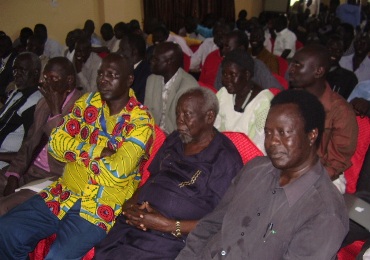N. Bahr el Ghazal officials condem demilitarised zone agreement
October 12 ,2012 (JUBA) – Leading activists and South Sudan Civil Society organizations members have expressed dissatisfaction about the recently-concluded cooperation agreement with Sudan, and vowed to mobilize public support to disown the deal.

Juba and Khartoum, under the facilitation of the African Union High Level Implementation Panel (AUHIP), signed several agreements on oil sharing and border demarcation in Addis Ababa, Ethiopia last month.
However, the SSCSA chairperson, who spoke for the first time since the deal was reached, said the agreement will ensure that Juba gives US$3.8 billion to Khartoum and will forgive all arrears that existed before South Sudan’s independence in July last year.
South Sudan, Mawiir claimed, will also pay US$28 per barrel to transport its oil through Sudan’s infrastructure, but added that the new deal largely ignored the issue of oil, Juba said was stolen by Khartoum last year resulting into the shutdown of oil production early in January.
He also assured the population that the civil society will work hard and sensitize the South Sudanese public on the details of the agreements to ensure that the young country’s future is decided by its citizens, and not “cliques”.
The role of civil society is to “speak for those who cannot speak for themselves”, Mawiir said.
The chairperson of the civil society alliance also dismissed the views expressed by the government’s negotiation team, who said deal will bring many benefits to the people of South Sudan.
“How many people own valuable properties in Sudan? How many people who are sure would get work permit in Sudan? This is just another deal which will take us back to square one which we did not want. This was [why] we voted at referendum [to] form an independent state,” he said.
The two nations, in April this year, were at the brink of war before the talks began in Addis Ababa. Also, despite the agreements’ omissions, including the highly sensitive issue of the future of Abyei, consensus was reached on some issues, such as border demarcation of some areas, oil export, and citizenship among others.
The newly reached deal will facilitate the return of oil exports in three to six months; an economic lifeline key to the success of both Sudan and South Sudan.
Meanwhile, Mawiir said the SSCSA strongly supports the government and people of Northern Bahr el Ghazal in their decision to reject a 14-mile demilitarized zone between the two neighboring countries.
By rejecting the move, the people Northern Bahr el Ghazal, he added, are simply exercising their constitutional rights and forming an “opposition” to the Juba government.
Ateny Wek Ateny, another member of the SSCSA expressed similar dissatisfaction with the deal, arguing that the negotiators should have included representatives from the border region at the talks in Addis Ababa, Ethiopia.
(ST)
